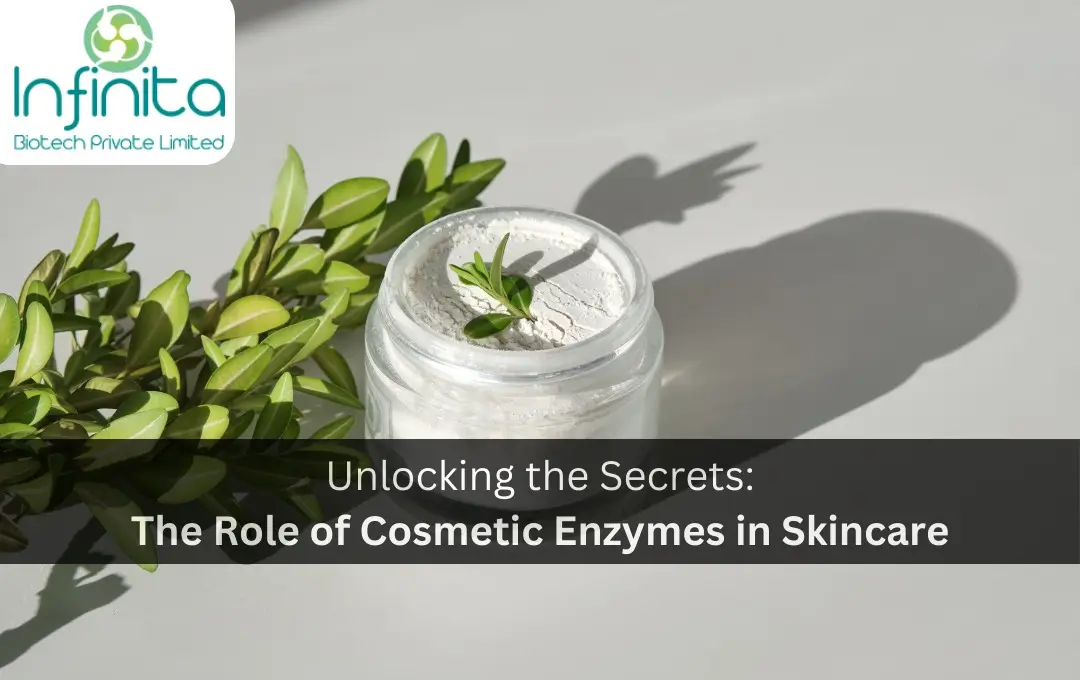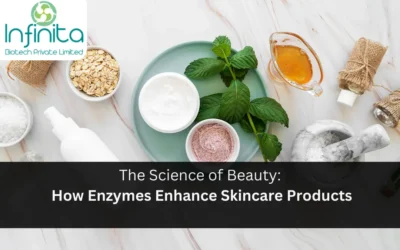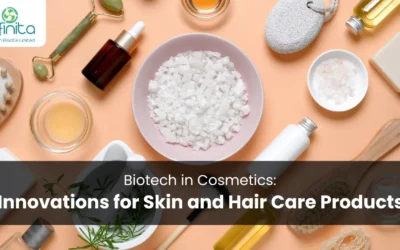In recent years, the beauty industry has been abuzz with talk of cosmetic enzymes and their incredible benefits for the skin. Many skincare enthusiasts are curious about what these enzymes are, how they work, and how they can be incorporated into their daily skincare routines. If you’ve been pondering these questions yourself, you’re in the right place! In this article, we’ll dive deep into the world of cosmetic enzymes and uncover the secrets behind their role in skincare.
Understanding Enzymes: A Brief Overview
Before we delve into the specifics of cosmetic enzymes, let’s take a moment to understand what enzymes are in general. Enzymes are naturally occurring proteins found in all living organisms, including our bodies. They act as catalysts, speeding up chemical reactions without being consumed in the process. In simpler terms, they are like tiny superheroes that make things happen faster!
Enzymes are complex molecules that play a crucial role in our body’s biological processes. They have specific shapes that fit perfectly with particular molecules called substrates. When an enzyme and substrate come together, a reaction occurs, resulting in the formation of a new product. In the context of skincare, enzymes can help break down unwanted substances on the skin’s surface, leaving it smooth and rejuvenated.
In our bodies, enzymes are involved in various vital functions. They aid in digestion, allowing us to extract nutrients from the food we eat. Enzymes also play a role in cell regeneration, helping to repair and renew damaged tissues. In skincare, enzymes act as gentle exfoliators, sloughing away dead skin cells and promoting a radiant complexion.
Enzymes are incredibly diverse and can be found in different parts of our body, each with its own unique function. For example, proteases are enzymes that break down proteins, lipases break down fats, and amylases break down carbohydrates. These enzymes work together in a complex network to ensure our body functions optimally.
One fascinating aspect of enzymes is their specificity. Each enzyme has a specific substrate that it can bind to and react with. This specificity is due to the enzyme’s active site, a region where the substrate binds and the reaction takes place. The active site is like a lock, and the substrate is the key that fits perfectly into it.
Enzymes are not only essential for our body’s internal processes but also have numerous applications in various industries. For example, in the food industry, enzymes are used to enhance flavors, improve texture, and extend shelf life. In the textile industry, enzymes are used to remove impurities and soften fabrics. Enzymes are even used in the production of biofuels, as they can break down plant materials into sugars that can be fermented to produce fuel.
Understanding enzymes is crucial for developing innovative solutions in fields such as medicine, agriculture, and biotechnology. Scientists are constantly studying enzymes to uncover their mechanisms, discover new enzymes, and engineer them for specific purposes. The more we understand enzymes, the more we can harness their power for the benefit of society.
The Science Behind Cosmetic Enzymes
Now that we have a basic understanding of enzymes, let’s explore how these amazing proteins work in the realm of cosmetics.
Enzymes are not only essential for various biological processes in our bodies, but they have also found their way into the world of skincare. Cosmetic enzymes, in simplified terms, are enzymes that have been harnessed for use in skincare products. These specialized enzymes work on the surface of the skin, targeting specific concerns such as uneven texture, clogged pores, and dullness.
But how exactly do cosmetic enzymes work their magic? Well, let’s dive deeper into their mechanism of action.
How Cosmetic Enzymes Work
Cosmetic enzymes are like little molecular superheroes that go to work on our skin. They possess the remarkable ability to break down unwanted substances, such as dead skin cells, excess sebum, and debris. By doing so, cosmetic enzymes help reveal smoother, clearer, and more youthful-looking skin.
Imagine your skin as a bustling city, with dead skin cells and impurities clogging up the streets. Cosmetic enzymes act as skilled traffic controllers, directing the flow and clearing out the congestion. They dissolve the bonds that hold these unwanted substances together, allowing them to be easily washed away.
But that’s not all! The benefits of incorporating cosmetic enzymes into your skincare routine go beyond just a smoother complexion.
The Benefits of Cosmetic Enzymes
Unlike harsh physical exfoliators, which can sometimes leave your skin feeling raw and irritated, enzymes offer a gentler approach to sloughing off dead skin cells. They work their magic without causing unnecessary trauma to your skin. This gentle exfoliation can improve skin texture, minimize the appearance of fine lines, and even out skin tone.
But wait, there’s more! Cosmetic enzymes can also help unclog pores, reducing the chances of developing pesky blackheads and whiteheads. By removing excess sebum and debris, enzymes promote clearer and healthier-looking skin. Say goodbye to those unwanted blemishes!
And here’s an added bonus: some enzymes have anti-inflammatory properties, making them suitable for individuals with sensitive or acne-prone skin. These enzymes help calm and soothe irritated skin, reducing redness and inflammation.
So, whether you’re looking to improve your skin’s texture, combat clogged pores, or soothe sensitive skin, cosmetic enzymes have got you covered.
Different Types of Cosmetic Enzymes and Their Roles
Not all cosmetic enzymes are created equal. Different types serve different purposes, targeting specific skin concerns. Let’s explore some commonly used cosmetic enzymes and how they benefit our skin.
Enzymes have become increasingly popular in skincare products due to their ability to provide targeted benefits without harsh chemicals. They work by catalyzing specific reactions, breaking down certain substances to improve the overall health and appearance of the skin.
Protease Enzymes
Protease enzymes, as the name suggests, work to break down proteins. They are particularly effective in dissolving the keratinized cells that make up the outermost layer of our skin. By removing these dead cells, protease enzymes reveal the fresh, youthful skin beneath.
These enzymes are commonly found in exfoliating products, such as scrubs and peels. They gently slough off dead skin cells, promoting a smoother and more radiant complexion. Additionally, protease enzymes can help improve the absorption of other skincare ingredients, allowing them to penetrate deeper into the skin.
Lipase Enzymes
Lipase enzymes are experts at breaking down fats and oils. If you struggle with oily skin or clogged pores, skincare products containing lipase enzymes can be your saving grace. These enzymes work diligently to remove excess sebum and impurities, leaving your skin feeling balanced and clean.
By targeting the oils on the skin’s surface, lipase enzymes help regulate sebum production, reducing the appearance of greasy skin. They also assist in unclogging pores, preventing the formation of blackheads and acne. With regular use, skincare products containing lipase enzymes can help you achieve a clearer and more refined complexion.
Hyaluronidase Enzymes
Hyaluronidase enzymes play a crucial role in maintaining the skin’s hydration levels. They break down hyaluronic acid, a naturally occurring molecule that attracts and retains water. By doing so, hyaluronidase enzymes help enhance the skin’s moisture retention abilities, resulting in a plump and hydrated complexion.
As we age, the production of hyaluronic acid in our skin decreases, leading to dryness and the appearance of fine lines. Skincare products containing hyaluronidase enzymes can help combat these signs of aging by promoting the synthesis of new hyaluronic acid and improving its distribution within the skin. This leads to improved skin elasticity and a more youthful appearance.
In addition to their hydrating properties, hyaluronidase enzymes can also aid in the penetration of other skincare ingredients. By breaking down hyaluronic acid, they create pathways for other beneficial compounds to enter the skin more effectively, maximizing their potential benefits.
Overall, cosmetic enzymes offer a wide range of benefits for the skin. Whether you’re looking to exfoliate, control oiliness, or boost hydration, there’s an enzyme out there that can help you achieve your skincare goals. Incorporating products containing these enzymes into your routine can lead to a healthier, more vibrant complexion.
Incorporating Enzymes into Your Skincare Routine
Now that you’re well-versed in the world of cosmetic enzymes, let’s talk about how you can incorporate these skincare superheroes into your daily routine.
Identifying Enzyme-Infused Products
When shopping for skincare products, keep an eye out for terms such as “enzyme-infused,” “enzymatic,” or specific enzyme names in the ingredient list. These indications mean that the product contains the desired enzymes you’re after. Look for cleansers, exfoliators, and masks that feature these powerful ingredients.
Best Practices for Using Enzyme Skincare Products
When using enzyme skincare products, it’s essential to follow a few best practices to maximize their benefits. Start by patch testing the product on a small area of your skin to ensure you don’t have any adverse reactions. Incorporate the product into your routine gradually, starting with once or twice a week and gradually increasing frequency if your skin tolerates it well. Always follow the product’s instructions and guidelines for application and removal.
Debunking Myths Around Cosmetic Enzymes
Now that you’re well-informed about the wonders of cosmetic enzymes, let’s address some common misconceptions surrounding their use.
Common Misconceptions about Cosmetic Enzymes
One common myth about cosmetic enzymes is that they can make your skin thinner. This is not true. Cosmetic enzymes only work on the outermost layer of the skin, known as the stratum corneum. They do not penetrate deeper layers or affect the skin’s structural integrity.
The Truth about Cosmetic Enzymes
The truth is that cosmetic enzymes offer a safe and effective way to enhance your skincare routine. When used correctly, they can provide gentle exfoliation, improve skin texture, and address a range of common skin concerns. Incorporating cosmetic enzymes into your skincare regimen can unlock a whole new level of radiance and vitality.
So, there you have it – the secrets behind the role of cosmetic enzymes in skincare. Armed with this knowledge, you can now make informed choices when selecting skincare products and create a routine that works wonders for your skin. Embrace the power of enzymes and unlock the beauty within!







